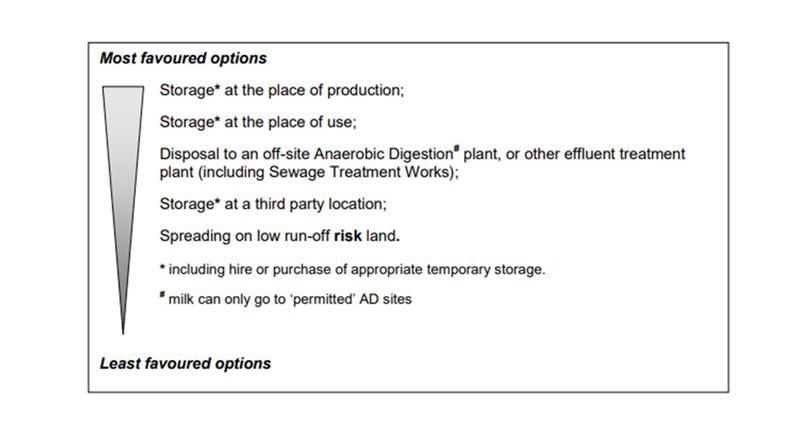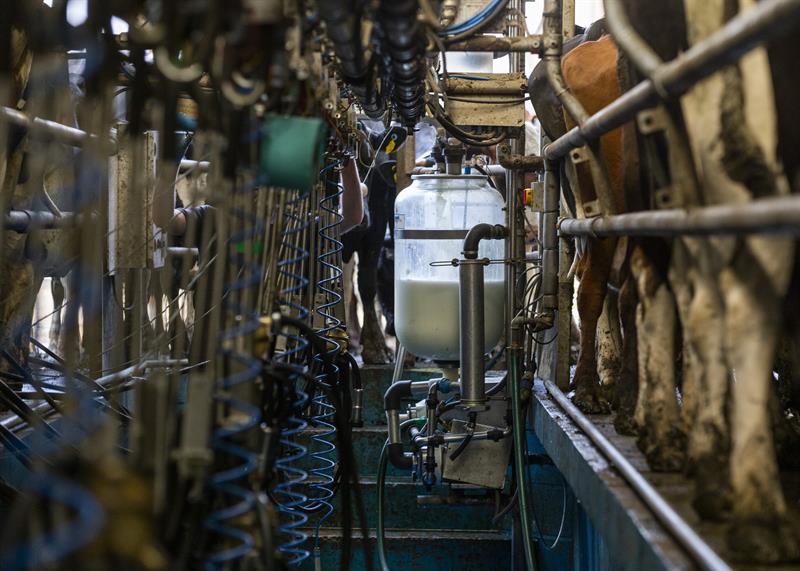This article outlines guidance for farmers who find themselves in a situation where milk collections are disrupted and they need to store, dispose of, or spread waste milk to land as a result of outcomes caused by COVID-19.
Information in this briefing comes from long-standing guidance regarding storing and spreading of milk under exceptional circumstances which can be found in full on the gov.uk website.
Contingency planning
The EA will expect farmers to have a contingency plan (accessible to staff and contractors) in place for instances when milk cannot be collected from the farm. Typically this would be expected for scenarios such as extreme weather when the tanker cannot access the farm but may also apply to major disruptions to agriculture and food supply, such as those caused by COVID-19.
Farmers should consider in advance contingency arrangements for their business using the following hierarchy of options:

Storage is the most favoured option, but is storage is not available farmers should consider disposal of the milk at a permitted anaerobic digestion plants, or as a last resort, spreading the milk on low run-off risk land.
The NFU has received reports of operational difficulties at water companies due to large quantities of milk entering the sewerage system. Milk falls under the definition of ‘trade effluent’ under the Water Industry Act 1991, and therefore it should not be discharged into public sewers without the consent of the appropriate sewerage undertaker (usually the water wholesaler). Discharging trade effluent into public sewers without such consent is a criminal offence punishable by an unlimited fine.
In instances where disposal to sewerage treatment works is a favourable option, members should apply for a temporary consent to discharge trade effluent by contacting their designated water wholesaler. Doing so will give the companies a better idea of what to expect and allow them to plan accordingly, and will ensure that no criminal offence is committed where the consent is granted.
To reduce the pressure on storage capacity, farmers should consider alternative storage arrangements and actions to minimise slurry production, wherever possible e.g. through using low volume pressure hoses in parlour wash-downs or consider making changes to a production system including moving to straw bed systems to produce solid manure instead.
SAFETY NOTE: If in the unfortunate instance milk must go into the slurry store, extra care must be taken as mixing milk with slurry can increase the amount of lethal and explosive gases it produces; for example, methane, carbon dioxide, ammonia, and hydrogen sulphide. All slurry stores, including any temporary stores, should comply with the requirements set out in this information sheet from the Health and Safety Executive in order to mitigate the risk from such gases as well as other risks such as drowning.
Redistributing milk into anaerobic digestion or pig units
Some AD plants may be suitable and have capacity for surplus milk. Interested members should email ABDA and REA, who are working jointly to link farmers to AD plants. Please state your contact phone number and estimated surplus litres when emailing them.
Whilst not a widescale solution, these options may provide opportunities for members to explore on a localised scale where these facilities are nearby.
The National Pig Association have produced some guidance to assist the sectors in utilising surplus milk on pig units. Your regional offices can support you in finding local liquid feed pig producers.
Members should check their individual contracts and make contact with their milk buyer before proceeding in redistributing any milk.
Spreading milk
If there are no alternative options, spreading milk (and slurry) must be spread ‘thinly and widely’ at an application rate not exceeding 20m3 per hectare*. (N.B. you must use a lower application rate if run-off could enter surface water)
Milk and slurry must only be spread on land with the lowest run-off risk i.e:
- has an average slope of less than 3 degrees;
- does not have land drains (other than sealed impermeable pipes);
- in the last 12 months, has not been pipe drained, mole drained, or sub-soiled;
- does not have a shallow soil (<30 cm) above fissured rock;
- has a sufficient depth and suitable type of soil above groundwater to prevent pollution;
- is not within a designated groundwater Source Protection Zone 1;
- is at least 50m from surface water or a conduit leading to a surface water, and at least 50m from springs, wells and boreholes where groundwater is used for human consumption;
- doesn’t have compacted soil or a soil surface which is capped (e.g. only spread where the soil is permeable and has a good structure).
*Waste Exemption: You can only spread milk to land at volumes of more than 20 m3 but below 50 m3 of diluted milk per hectare in any 24 hour period if you have a U10 waste exemption.
N.B. Waste exemptions exempt the farmer from the need to apply for an Environmental Permit; they are not an exemption from the requirement to adhere to waste regulations since exemptions contain conditions that must be met. All waste exemptions are free to register and are valid for three years.
Important legal information
The NFU has received reports of operational difficulties at water companies due to large quantities of milk entering the sewerage system. Milk falls under the definition of ‘trade effluent’ under the Water Industry Act 1991, and therefore it?should not?be discharged into public sewers without the consent of the appropriate sewerage undertaker (usually the water wholesaler). Discharging trade effluent into public sewers without such consent is a criminal offence punishable by an unlimited fine.
In instances where disposal to sewerage treatment works is a favourable option, members should apply for a temporary consent to discharge trade effluent by contacting their designated water wholesaler. Doing so will give the companies a better idea of what to expect and allow them to plan accordingly, and will ensure that no criminal offence is committed where the consent is granted.
Contacting the Environment Agency:
You must contact the EA if:
- your slurry or milk store is at risk of overflowing or leaking
- you cannot avoid spreading slurry or milk on agricultural land and there is a risk of runoff, run-through to land drains or leaching
- you are at risk of breaching the legal requirements of:
Due to the impact of COVID-19, the EA has advised that the best method of contact is via email rather than the postal address, or phone.
Please quote ‘Agriculture & COVID-19’ in any email correspondence.
- Email: ZW5xdWlyaWVzQGVudmlyb25tZW50LWFnZW5jeS5nb3YudWs=
- Telephone: 03708 506 506 to speak to EA's National Customer Contact Centre.
- Telephone from outside the UK (Monday to Friday, 8am to 6pm GMT)+44 (0) 114 282 5312 (Monday to Friday, 8am to 6pm.)
- Environment incident hotline: 0800 80 70 60 (out of hours or in an emergency)
Coronavirus: Updates and advice
This news hub on NFUonline will be updated regularly to keep you up to date with what you need to know and how to deal with the various issues raised by coronavirus. Visit the hub.
Click here to use the NFU's COVID-19 business impact service.
By using this form, farmers and growers can provide information on any business-critical issues they have encountered, or expect to encounter, arising from the COVID-19 outbreak. The NFU will log this information and use it in an anonymised format to flag the key issues agriculture and horticulture are facing to government on a daily basis. However, no personal data will be shared with the government. The service is for all farmers and growers across the UK.

